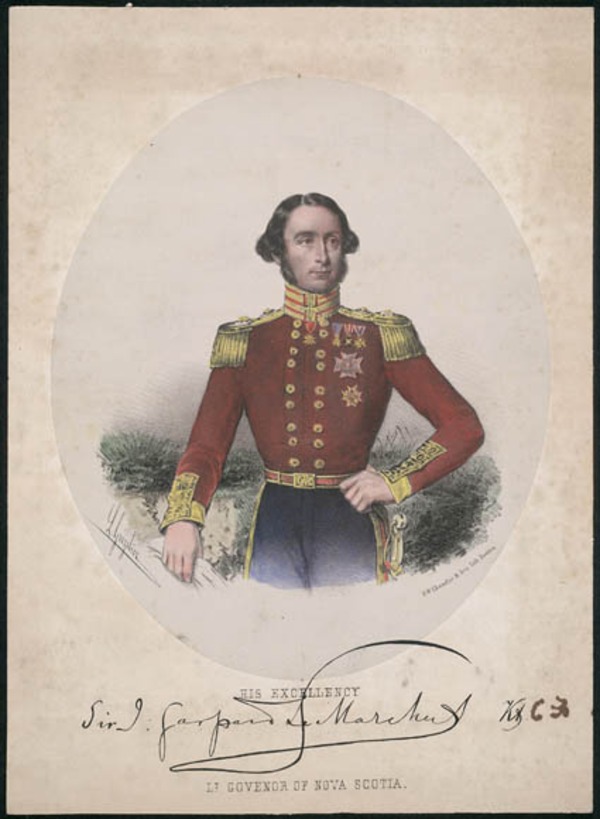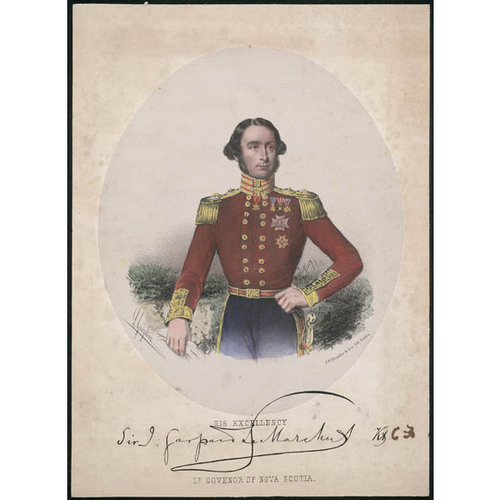LE MARCHANT, Sir JOHN GASPARD, army officer and colonial administrator; b. in England in 1803, third son of John Gaspard Le Marchant and Mary Cary; m. 28 May 1839 to Margaret Anne Taylor by whom he had several children; d. in London, Eng., 6 Feb. 1874.
John Gaspard Le Marchant was a member of a distinguished Guernsey family. He entered the army at the age of 17 as an ensign, and made a series of moves upward, all by purchase. Within a dozen years he was a major serving in Cape Colony. In all he spent £10,000 to purchase commissions and was one of the youngest officers in the British army to command a regiment.
In 1846 he was, according to his own account, “unexpectedly” offered the lieutenant governorship of Newfoundland. Perhaps the influence of his brother, Denis Le Marchant, a prominent Whig who was appointed under-secretary of the Board of Trade by Lord John Russell’s government in 1847, prompted the offer. John Gaspard Le Marchant had loved soldiering and left it only after positive assurance from the Duke of Wellington that the acceptance of the civil position would promote his prospects in the army. Le Marchant’s appointment became official in February 1847 and he arrived in St John’s in April succeeding Sir John Harvey*. Unlike Harvey, Le Marchant was devoid of experience in administering a government. He came at a difficult time. St John’s had been devastated, on 9 June 1846, by a great fire that rendered 12,000 of its 19,000 people homeless. The potato crops of 1846 and 1847 were badly affected by the same blight that wrought such havoc in Ireland.
After these difficulties, Le Marchant, and Newfoundland, had a short run of good luck. By the end of 1849 he was able to report that political activity, the bane of the colony, as he believed, was at a low ebb. This subsidence did not last long. The Liberals, who were mainly Roman Catholics, produced a rancorous agitation for responsible government, something which the commercial classes of the colony, heavily Protestant, Le Marchant himself, and the colonial secretary in London all opposed.
Le Marchant deplored many local habits: those of the merchant princes wont to retire to England with their profits, those of improvident fishermen. The merchants devised ingenious schemes for dodging taxes, and the fishermen sought whatever forms of relief the government would provide. So great were the prejudices against direct taxation that the legislature was afraid to establish municipal organizations to raise money through rates for local charges.
In the summer of 1852 Le Marchant went to Nova Scotia as lieutenant governor. There, with James Boyle Uniacke*, William Young*, and Joseph Howe leading a responsible ministry, the lieutenant governor’s position was different. Le Marchant’s governorship was much less controversial than his tenure in Newfoundland; but impartiality, which was now the lieutenant governor’s role, did not prevent his being criticized by those who were out of office and wanted to be in. The change of government from Liberal to Tory in 1857 was effected with some party bitterness; but when Le Marchant was finally to leave Nova Scotia, in February 1858, he was praised by Conservative papers for his judiciousness. The Liberals tended to be more critical (they were now out of office), but even they felt compelled to avoid acrimony.
Le Marchant himself believed, or at least on 7 March 1856 he told Henry Labouchere, the secretary of state for the colonies, that in both Newfoundland and Nova Scotia he had lived “in the most perfect harmony, both with my Executive Councillors, as well as the two Houses of the Legislature. . . . At the present moment they [Nova Scotian affairs] are in every sense most satisfactory.”
Le Marchant was governor of Malta from 1859 to 1864, and was commander-in-chief of Madras, 1865–68, after which he retired to England. He was given a kcb in 1865. He was an enthusiastic horseman and agriculturalist, who sought to encourage good farming practices in both Newfoundland and Nova Scotia. He was never a man to stay put in government house, but sought an over-all view of his constituency. Le Marchant also believed that a successful governor in British North America had to entertain frequently and liberally, even lavishly. Over and above his £3,000 income he spent some £4,000 to £5,000 outfitting himself for his North American missions and another £5,000 from his private purse for dinners and parties in the colonies.
It is fair to add that the Duke of Wellington’s views were not justified in the event. The Crimean War saw Le Marchant left on the shelf in Nova Scotia, while officers who had been his contemporaries in the army went gloriously to war and became major generals, to Le Marchant’s almost daily mortification.
[There are a few interesting private letters from John Gaspard Le Marchant to Henry Labouchere, secretary of state for the colonies, in a small private collection owned by Professor R. L. Raymond of Dalhousie University (Halifax). Especially useful here were letters of 7 March 1856 (private and confidential) and 18 Dec. 1857 (private). I am grateful to Professor Raymond for placing these papers unreservedly at my disposal. p.b.w.]
Le Marchant’s dispatches from Newfoundland are in PRO, CO 194/127–194/136; from Nova Scotia, PRO, CO 217/122–217/124. Secondary sources are: Burke’s peerage (1967). DNB. Gunn, Political history of Nfld.
Cite This Article
P. B. Waite, “LE MARCHANT, Sir JOHN GASPARD,” in Dictionary of Canadian Biography, vol. 10, University of Toronto/Université Laval, 2003–, accessed February 13, 2026, https://www.biographi.ca/en/bio/le_marchant_john_gaspard_10E.html.
The citation above shows the format for footnotes and endnotes according to the Chicago manual of style (16th edition). Information to be used in other citation formats:
| Permalink: | https://www.biographi.ca/en/bio/le_marchant_john_gaspard_10E.html |
| Author of Article: | P. B. Waite |
| Title of Article: | LE MARCHANT, Sir JOHN GASPARD |
| Publication Name: | Dictionary of Canadian Biography, vol. 10 |
| Publisher: | University of Toronto/Université Laval |
| Year of publication: | 1972 |
| Year of revision: | 1972 |
| Access Date: | February 13, 2026 |




